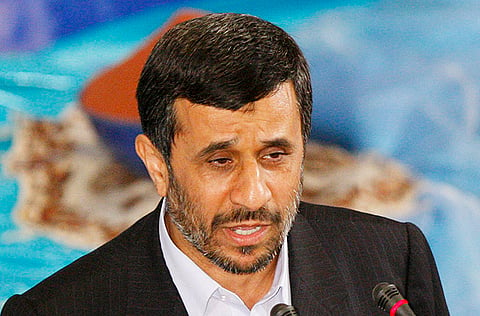Ahmadinejad reneges on slogans
Iranian president believes he is sufficiently entrenched in power to take non-populist policy decisions

By lifting chronic government subsidies on essential goods, President Mahmoud Ahmadinejad has taken a risk that no other Iranian leader before him had dared to do. His ‘surgical' move to streamline the economy led to a 400 per cent rise in petrol prices and similar sharp hikes in such critical items as bread, utilities and cooking oil.
Public response to these measures has been muted so far, thanks to the climate of fear hanging since last year's controversial presidential election, but even if any protests break out, the government is quite ready to deal with it.
It is actually ironic for Ahmadinejad to apply shock therapy to a dismal economy plagued by massive unemployment and runaway inflation. He came to power six years ago with a populist mandate — economic justice for all — and he made the same promise to ensure his re-election in June 2009.
However, 18 months into his second term, the president appears to have surmounted a tremendous popular challenge to his rule, and he is sufficiently entrenched in power to renege on his slogans.
The lifting of subsidies, estimated to cost the government about a $100 billion (Dh367 billion) a year, is an enormous victory for Ahmadinejad and it has helped boost his image at home as a strong leader.
All political groups, including many of his fellow conservatives in parliament, had opposed the shock approach to the economy, fearing a popular backlash, but they were unable to stop him as they did with the previous president Mohammad Khatami.
Assured of this victory, Ahmadinejad is now bracing to pursue the same tough line on foreign policy, with the chief goal of ending the UN economic sanctions imposed over Iran's controversial nuclear programme.
The president is obviously aware that his domestic triumphs could be short-lived if he cannot find a way to have the embargo lifted. Soaring energy and food prices, coupled with sanctions, could send prices skyrocketing and trigger massive unemployment. This is a prospect that Iran needs to avoid at all costs.
Hands-on methods
This is perhaps why the president has taken personal charge of foreign diplomacy and gone on a charm offensive to improve relations with other countries, mainly Arab neighbours.
Recently, Ahmadinejad sacked Foreign Minister Manouchehr Mottaki and replaced him with Iran's nuclear chief Ali Akbar Salehi in an apparent bid to give a solid direction to Iran's foreign policy.
Mottaki was seen as a lacklustre diplomat unable to carry out his boss' "grand visions" for the world, but many analysts believe he was fired due to his close ties to parliament speaker Ali Larijani, who has emerged as Ahmadinejad's chief political rival in the absence of a viable opposition.
Ahmadinejad has long blamed "multiple voices" within Iran for diplomatic failures and what he calls "misunderstandings" in the world about his intentions. "We have institutions in foreign policy that act out of tune. Our diplomacy has to change and developments are under way," he said recently.
Confusion in decision-making is indeed nothing new in Iran. Government cabinets in the Islamic Republic are traditionally filled with dissenting voices who represent various and sometimes clashing factions.
Key cabinet posts — such as oil, intelligence, interior, defence and foreign affairs — have to be filled with qualified candidates approved by Supreme Leader Ayatollah Ali Khamenei, who has near unlimited powers.
But, as opposed to his predecessors, Ahmadinejad has refused to be a mere administrator carrying out orders and he has already gotten rid of all the ministers imposed on him.
A few months ago he appointed special envoys to circumvent the foreign ministry in reaching out to the world. But the move was met with fierce opposition from within his own conservative camp and Ahmadinejad was later forced to backtrack.
But the president appears to be undaunted by internal opposition to his foreign policy goals and earlier this month he dispatched Esfandiar Rahim Mashaei, a close aide and relative, to Jordan to invite King Abdullah to visit Iran.
Ahmadinejad is also showing more flexibility on the nuclear issue, generating slight hope for the next round of talks with the great powers in Istanbul in late January. And, still further, there are whispers of improving ties with Iran's arch foe, the US.
All these hitherto taboo matters go against the grain of Ahmadinejad's radical slogans and they may risk irking the old guard in the Islamic regime. But riding high on domestic triumphs, quelling all dissidents and imposing his economic agenda, the president seems to be immune to criticism at this juncture.
It is as yet unclear how the house cleaning in the diplomatic apparatus will affect Iran's foreign policy, especially on the nuclear front and future ties with the US. Up until now the nuclear issue has been kept beyond the reach of the foreign ministry and handled exclusively by the Supreme National Security Council, which is Iran's highest political and security decision maker. But Mottaki's removal may give Ahmadinejad a freer hand in striking a deal on tough issues when he thinks the time is right.
Despite his extreme rhetoric, the maverick president has proven to be a quintessential politician driven less by ideology than ego, and he has a way of making taboos appear normal. So it might not look too surprising if one day not too far away Ahmadinejad will bear the banner of peace with America, the "Great Satan."
Mehrdad Balali is a journalist and writer living in California. His novel Houri was recently published in New York.


